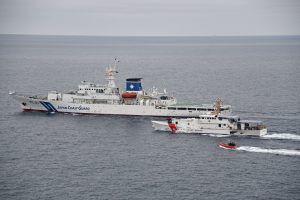The Quad Leaders summit announced the inaugural Quad-at-Sea Ship Observer Mission, scheduled to launch in 2025 in the Indo-Pacific. That marks a significant step toward enhancing regional security and countering growing China’s maritime assertiveness in the Indo-Pacific. Quad coast guard cooperation can potentially bring other countries on board, not only improving interoperability among maritime agencies but significantly transforming the region’s maritime security landscape.
At the heart of this evolving dynamic is China’s growing assertiveness, notably in the South China Sea and East China Sea. In a recent incident, a Chinese Coast Guard vessel harassed and rammed Philippine Coast Guard ships at the Second Thomas Shoal. This incident, like many other recent clashes involving China, sparked international outcry and criticism.
The continuing harassment of fishermen and naval warships by Chinese “maritime militia” in the South China Sea is a serious maritime safety and security concern. China employs “gray zone” tactics to secure territorial gains while avoiding direct armed conflict, thereby asserting considerable regional influence. This called for a cooperative effort. Thus the Quad’s Coast Guard cooperation was created to enhance strategic and defense collaboration, counter China’s extensive maritime actions, and reinforce a shared commitment to international law, maritime freedom, and regional security.
For countries like the United States, Australia, India, and Japan, prioritizing a free and open Indo-Pacific is crucial. Each nation faces its own distinct security challenges within the region. The U.S., for instance, aims to sustain its global maritime dominance, whereas Australia worries about the expanding Chinese influence in the South Pacific. India is concerned about China’s growing naval influence in the Indian Ocean, while Japan confronts direct territorial disputes with China in the East China Sea. Although these nations share the common interest of deterring China’s aggressive stance in the region, the Quad countries have struggled to formulate a coherent policy to strengthen their position against the rising Chinese threat. Coast guard cooperation presents a promising avenue to enhance collaboration.
Additionally, this cooperation can foster much-needed cohesion among the Quad countries. Military partnerships among these countries are already strong, mainly through the Malabar exercise, in which all the Quad members have regularly participated since 2020. The active defense collaboration among these nations promotes a deep sense of trust and partnership. This new initiative enhances non-military maritime cooperation. Coast guard cooperation will also foster dialogue with ASEAN nations and other coastal states in the Indian and Pacific Oceans. Coast guard vessels are less intrusive, providing Quad countries flexibility.
Coast guards play a critical role in enforcing law and order at sea, ensuring maritime domain awareness (MDA), protecting fisheries, combating piracy, and preventing illegal trafficking and poaching. In this context, stronger coast guard cooperation allows the Quad members to project influence in the gray zone of maritime operations – activities that fall below the threshold of military conflict but are crucial for asserting national and international law.
By leveraging the Quad’s support, Southeast Asia can identify its primary focus areas and effectively monitor their maritime borders from terrorism and crime. Initiatives like the Indo-Pacific Partnership for Maritime Domain Awareness (IPMDA) and the Maritime Initiative for Training in the Indo-Pacific (MAITRI) will provide partner countries with tools to address these threats. This comprehensive approach can lead to more meaningful interaction between the Quad and Southeast Asian nations, demonstrating the Quad’s commitment to supporting its regional partners.
Quad coast guard cooperation also enhances the “Quad Plus” framework, opening avenues for cooperation with like-minded countries like Vietnam, the Philippines, and Indonesia, which also face significant challenges from China in the maritime domain. As these countries increasingly look to the Quad countries for support, the initiative can serve as a confidence-building measure, reinforcing the notion of a broader coalition against Chinese military actions in the region. This cooperation can also help Quad countries enhance their ability to monitor and deter China’s incremental territorial gains through collective vigilance and deterrence.
In conclusion, the new coast guard cooperation among the U.S., Australia, India, and Japan is a crucial step in building a resilient and unified front in the Indo-Pacific. As China’s assertiveness continues to grow, this collaboration will strengthen not only the maritime security architecture of the Quad countries but also serve as a bulwark for the broader international order. By focusing on non-military avenues of cooperation, the initiative underscores the importance of upholding international norms, maintaining freedom of navigation, and ensuring peace and stability in one of the world’s most geopolitically significant regions.
































